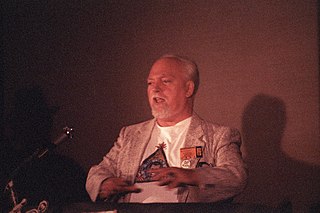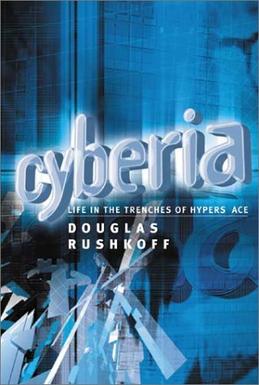Related Research Articles

Cyberpunk is a subgenre of science fiction in a dystopian futuristic setting that tends to focus on a "combination of lowlife and high tech", featuring futuristic technological and scientific achievements, such as artificial intelligence and cyberware, juxtaposed with societal collapse, dystopia or decay. Much of cyberpunk is rooted in the New Wave science fiction movement of the 1960s and 1970s, when writers like Philip K. Dick, Michael Moorcock, Roger Zelazny, John Brunner, J. G. Ballard, Philip José Farmer and Harlan Ellison examined the impact of drug culture, technology, and the sexual revolution while avoiding the utopian tendencies of earlier science fiction.

Robert Anton Wilson was an American author, futurist, psychologist, and self-described agnostic mystic. Recognized within Discordianism as an Episkopos, pope and saint, Wilson helped publicize Discordianism through his writings and interviews. In 1999 he described his work as an "attempt to break down conditioned associations, to look at the world in a new way, with many models recognized as models or maps, and no one model elevated to the truth". Wilson's goal was "to try to get people into a state of generalized agnosticism, not agnosticism about God alone but agnosticism about everything."

Judith Milhon, best known by her pseudonym St. Jude, was a self-taught programmer, civil rights advocate, writer, editor, advocate for women in computing, hacker and author in the San Francisco Bay Area.
The eight-circuit model of consciousness is a holistic model originally presented as psychological philosophy by Timothy Leary in books including Neurologic (1973) and Exo-Psychology (1977), later expanded on by Robert Anton Wilson in his books Cosmic Trigger (1977) and Prometheus Rising (1983), and by Antero Alli in his books Angel Tech (1985) and The Eight-Circuit Brain (2009), that suggests "eight periods [circuits]" within the model. This model has been described as a potential route towards reconciling different interpretations of what it means to be a human being. The eight circuits, or eight systems or "brains", as referred by other authors, operate within the human nervous system. Each corresponds to its own imprint and subjective experience of reality. Leary and Alli include three stages for each circuit, detailing developmental points for each level of consciousness.

Humanity+ is a non-profit international educational organization that advocates the ethical use of technologies and evidence-based science to improve the human condition. This condition includes the health of physiological and neurological functions affected by aging and disease, the ecological health and well-being for all life forms, and the future advancements for a more human humanity. Its work includes:

Internet culture is a quasi-underground culture developed and maintained among frequent and active users of the Internet who primarily communicate with one another online as members of online communities; that is, a culture whose influence is "mediated by computer screens" and Information Communication Technology, specifically the Internet.

Mondo 2000 was a glossy cyberculture magazine published in California during the 1980s and 1990s. It covered cyberpunk topics such as virtual reality and smart drugs. It was a more anarchic and subversive prototype for the later-founded Wired magazine.

Cyberia is a book by Douglas Rushkoff, published in 1994. The book discusses many different ideas revolving around technology, drugs and subcultures. Rushkoff takes a Tom Wolfe Electric Kool-Aid Acid Test style, as he actively becomes a part of the people and culture that he is writing about. The book goes with Rushkoff as he discusses topics ranging from online culture, the concept of a global brain as put forth in Gaia theory, and Neoshamanism.

Jon Lebkowsky is an American web consultant/developer, author, and activist who was the co-founder of FringeWare Review. FringeWare, an early attempt at ecommerce and online community, published a popular "magalog" called FringeWare Review, and a literary zine edited by Lebkowsky called Unshaved Truths. FringeWare's email list, called the FringeWare News Network, established an international following for the organization, which also opened a store in Austin, Texas.

Bruce Fancher is a former computer hacker and member of the Legion of Doom hacker group. He co-founded MindVox in 1991 with Patrick K. Kroupa.

Kevin Maloof, better known by his pseudonym, Gareth Branwyn, is a writer, editor, and media critic.

Cyberpunk is the fifth studio album by English rock musician Billy Idol, released on 29 June 1993 by Chrysalis Records. A concept album, it was inspired by his personal interest in technology and his first attempts to use computers in the creation of his music. Idol based the album on the cyberdelic subculture of the late 1980s and early 1990s. Heavily experimental in its style, the album was an attempt to take control of the creative process in the production of his albums, while simultaneously introducing Idol's fans and other musicians to the opportunities presented by digital media.

Giulio Prisco is an Italian information technology virtual reality consultant; as well as a writer, futurist, transhumanist, and cosmist. He is an advocate of cryonics and contributes to the science and technology online magazine Tendencias21. He produced teleXLR8, an online talk program using virtual reality and video conferencing, and focused on highly imaginative science and technology. He writes and speaks on a wide range of topics, including science, information technology, emerging technologies, virtual worlds, space exploration and futurology.
Encyclopaedia Psychedelica International was an independent London-based magazine in the late 1980s that mixed a return to hippie values combined with new emerging technology, at a time when to call someone a 'Hippie' was considered an insult. This publication may be considered a rallying point for those who were looking for a greater degree of spirituality-based themes in everyday life, and simultaneously a call to action for the early cyberpunk community in the UK and beyond. It was a stepping stone towards the group's public event production activities, which included a rave called Evolution in 1990, and the Megatripolis nightclub, which was a regular club night attended by David Bowie and other counterculture personalities of the era.

Cyberdelic was the fusion of cyberculture and the psychedelic subculture that formed a new counterculture in the 1980s and 1990s.

The works of William Gibson encompass literature, journalism, acting, recitation, and performance art. Primarily renowned as a novelist and short fiction writer in the cyberpunk milieu, Gibson invented the metaphor of cyberspace in "Burning Chrome" (1982) and emerged from obscurity in 1984 with the publication of his debut novel Neuromancer. Gibson's early short fiction is recognized as cyberpunk's finest work, effectively renovating the science fiction genre which had been hitherto considered widely insignificant.
The following is a list of works by Timothy Leary. The majority of Leary's works were put into the public domain by his estate in 2009.

Douglas Mark Rushkoff is an American media theorist, writer, columnist, lecturer, graphic novelist, and documentarian. He is best known for his association with the early cyberpunk culture and his advocacy of open-source solutions to social problems.
The Jargon File is a glossary and usage dictionary of slang used by computer programmers. The original Jargon File was a collection of terms from technical cultures such as the MIT AI Lab, the Stanford AI Lab (SAIL) and others of the old ARPANET AI/LISP/PDP-10 communities, including Bolt, Beranek and Newman, Carnegie Mellon University, and Worcester Polytechnic Institute. It was published in paperback form in 1983 as The Hacker's Dictionary, revised in 1991 as The New Hacker's Dictionary.
Patrick Karel Kroupa is an American writer, hacker and activist. Kroupa was a member of the Legion of Doom and Cult of the Dead Cow hacker groups and co-founded MindVox in 1991, with Bruce Fancher. He was a heroin addict from age 14 to 30 and got clean through the use of the hallucinogenic drug ibogaine.
References
- ↑ "Introducing the Mondo 2000 History Project – 10 Zen Monkeys" . Retrieved 30 August 2017.
- ↑ See Works by R. U. Sirius at Project Gutenberg .
- ↑ The Whole World is Talking Archived 2013-05-07 at the Wayback Machine by Cooke and Lehrer
- ↑ This Is the First Article We Ever Published About the Internet in The Nation by Richard Kreitner, November 19, 2014
- ↑ "Program VR Oslo 94". Archived from the original on 2011-05-07. Retrieved 2016-01-23.
- ↑ Archived April 16, 2004, at the Wayback Machine
- ↑ Sirius, R. U. "20 Point Party Platform for National Politics". Archived from the original on 2008-04-22. Retrieved 2010-02-24.
- ↑ Available at The RU Sirius Show and NeoFiles respectively.
- ↑ Archived December 4, 2008, at the Wayback Machine
- ↑ "H+ Magazine homepage".
- ↑ "Acceler8or". www.acceler8or.com. Retrieved 30 August 2017.
- ↑ "Accelerate with Acceler8or! – KurzweilAI". www.kurzweilai.net. Retrieved 30 August 2017.
- ↑ "Mondo 2000, influential 90s cyberculture magazine, returns online". 24 August 2017. Retrieved 25 August 2017.